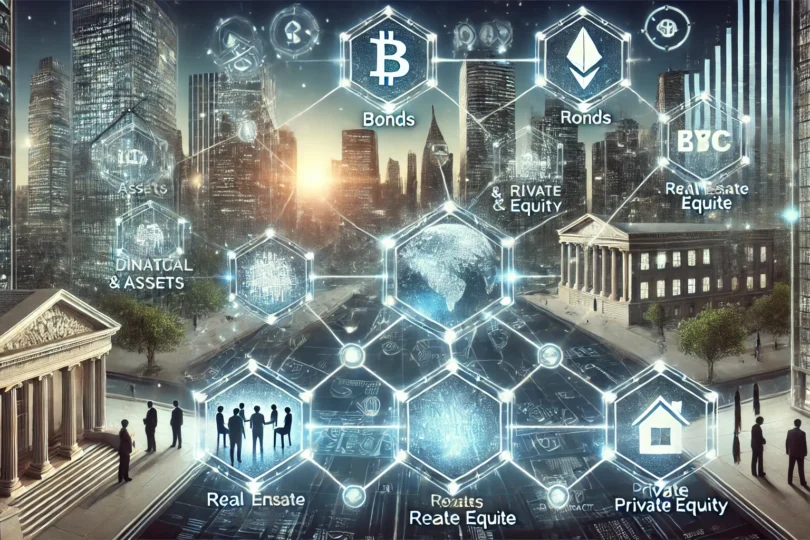Tokenization, the process of converting real-world assets into digital tokens on a blockchain, is rapidly gaining traction in the financial world. This innovative approach promises to enhance liquidity, reduce transaction costs, and democratize access to traditionally illiquid assets. Here’s a comprehensive overview of the recent developments and future prospects of tokenized assets.
Key Developments in Tokenization
- Expansion Across Asset Classes Tokenization is moving beyond cryptocurrencies and is now being applied to a variety of real-world assets. These include bonds, real estate, and private equity. For instance, over $10 billion worth of tokenized bonds have been issued globally, with notable issuers like Siemens and the World Bank. This trend is supported by the operational efficiencies and the potential for fractional ownership, making these assets more accessible to a broader range of investors (McKinsey & Company) (Finextra Research).
- Government and Regulatory Support Governments around the world are increasingly recognizing the benefits of tokenization. Countries like Hong Kong, Thailand, and Switzerland are reforming regulations to accommodate the use of blockchain technology for financial assets. This regulatory support is crucial for the mainstream adoption of tokenized assets, ensuring security, transparency, and legal compliance (Finextra Research).
- Operational Efficiencies and Cost Reduction One of the major advantages of tokenization is the operational efficiency it brings. Tokenized assets can be transferred directly between parties within minutes, eliminating intermediaries and reducing transaction costs. Smart contracts automate processes such as compliance and settlement, further streamlining operations and reducing the potential for errors (treasuryXL | The Treasury Community).
Benefits of Tokenization
- Increased Liquidity Tokenization enhances liquidity by enabling fractional ownership and 24/7 trading. This is particularly beneficial for assets like real estate and private equity, which have traditionally been less liquid. By breaking down these assets into smaller units, a larger pool of investors can participate, thereby increasing market liquidity (CoinDesk).
- Democratized Access Fractional ownership facilitated by tokenization lowers the investment threshold, making it possible for smaller investors to access high-value assets. This democratization of investment opportunities is particularly significant for individuals who have historically been excluded from such markets (Finextra Research).
- Enhanced Transparency and Security Blockchain technology ensures a transparent and immutable record of ownership. This not only enhances security but also simplifies the tracking and servicing of assets. The built-in compliance and automated settlement processes further enhance the integrity and efficiency of transactions (EY).
Challenges and Future Outlook
Despite its promising potential, the widespread adoption of tokenization faces several challenges. Regulatory uncertainties, the lack of standardized processes, and the reluctance of incumbents to embrace new technologies are significant hurdles. Additionally, issues related to interoperability and the technical bottlenecks of current infrastructure need to be addressed to facilitate seamless integration with existing financial systems (treasuryXL | The Treasury Community).
However, the progress made in 2023 and early 2024, such as the establishment of comprehensive regulatory frameworks and the development of interoperability solutions, indicates a positive trajectory for tokenized assets. Industry experts predict that the market for tokenized real-world assets could reach trillions of dollars by 2030, potentially representing a significant portion of global GDP (EY) (treasuryXL | The Treasury Community).
Conclusion
Tokenization is set to revolutionize the financial landscape by enhancing liquidity, reducing costs, and democratizing access to a wide range of assets. While challenges remain, the ongoing regulatory support and technological advancements are paving the way for a more integrated and efficient financial ecosystem. As traditional financial institutions and new entrants continue to explore and adopt tokenization, the future of finance looks increasingly digital and decentralized.
Hashtags
#Tokenization #Blockchain #DigitalAssets #FutureOfFinance


The tokenization of assets represents a significant evolution in the financial industry, poised to revolutionize how assets are managed, traded, and owned. By converting real-world assets like bonds, real estate, and private equity into digital tokens on a blockchain, tokenization enhances liquidity, reduces transaction costs, and democratizes access to traditionally illiquid markets. This transformation is driven by the operational efficiencies and transparency that blockchain technology offers, making it possible for investors to engage with a broader range of assets with lower barriers to entry (CoinDesk) (McKinsey & Company).
Governments and regulatory bodies worldwide are recognizing the potential of tokenization and are reforming policies to facilitate its growth. Countries such as Hong Kong, Thailand, and Switzerland are leading the way by creating supportive regulatory environments that allow for the secure and efficient tokenization of assets. This regulatory backing is crucial as it provides the necessary legal framework to ensure the safe and transparent operation of tokenized asset markets, fostering greater investor confidence (Finextra Research) (treasuryXL | The Treasury Community).
The benefits of tokenization are manifold. Fractional ownership, enabled by tokenization, lowers investment thresholds, allowing smaller investors to participate in markets that were previously inaccessible. This democratization of investment opportunities is particularly significant for enhancing financial inclusion. Additionally, the automation of compliance and settlement processes through smart contracts not only reduces costs but also minimizes errors and enhances the overall efficiency of transactions, making tokenized markets more attractive to investors and issuers alike (EY).
However, challenges remain. Regulatory uncertainties, the lack of standardized processes, and the reluctance of traditional financial institutions to adopt new technologies pose significant hurdles to the widespread adoption of tokenization. Addressing these challenges requires ongoing collaboration between regulators, technology providers, and financial institutions to create a robust, scalable infrastructure that integrates seamlessly with existing financial systems. Despite these obstacles, the progress made thus far suggests a promising future for tokenized assets, with industry experts predicting substantial growth in this market over the next decade (treasuryXL | The Treasury Community).